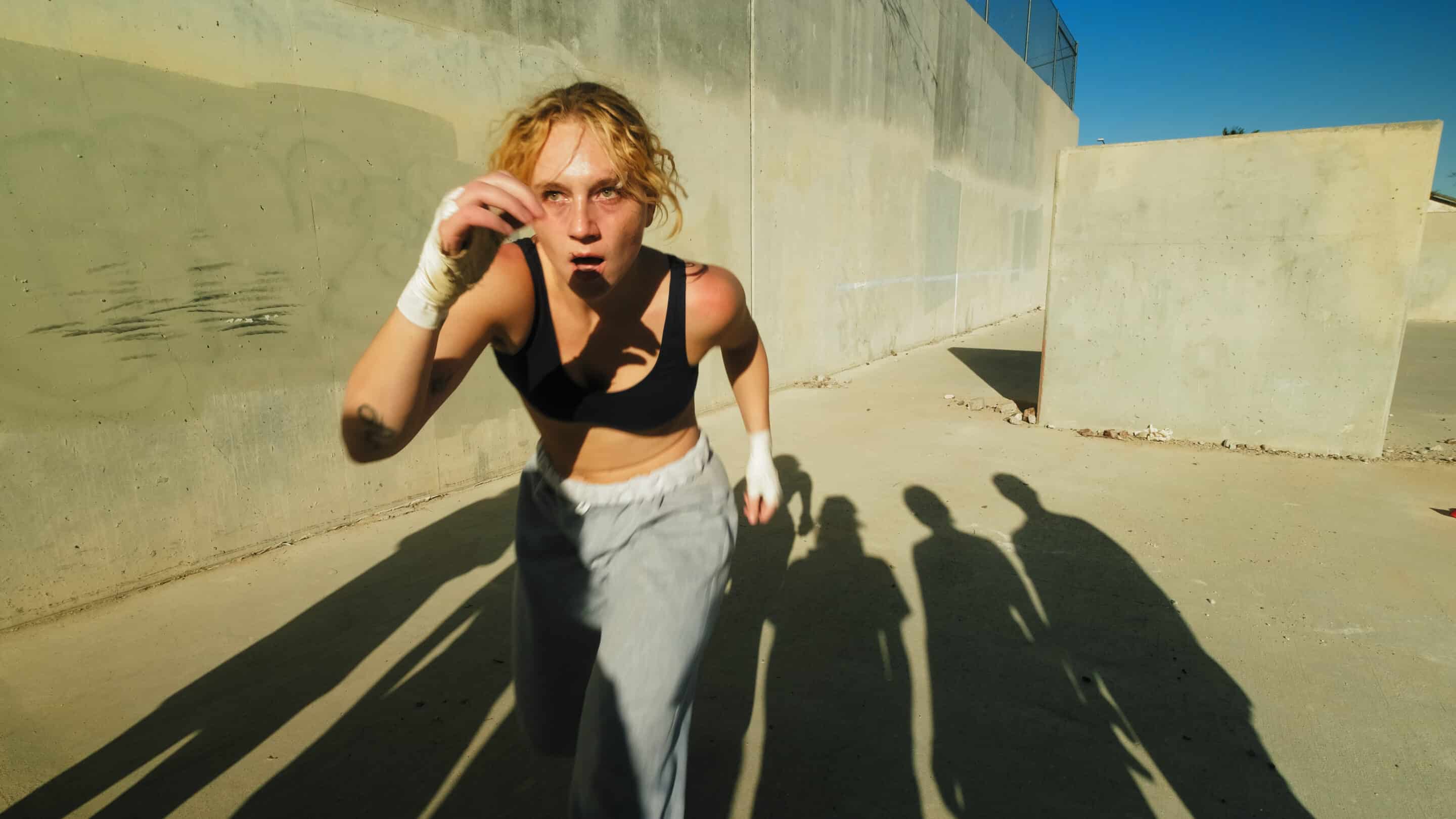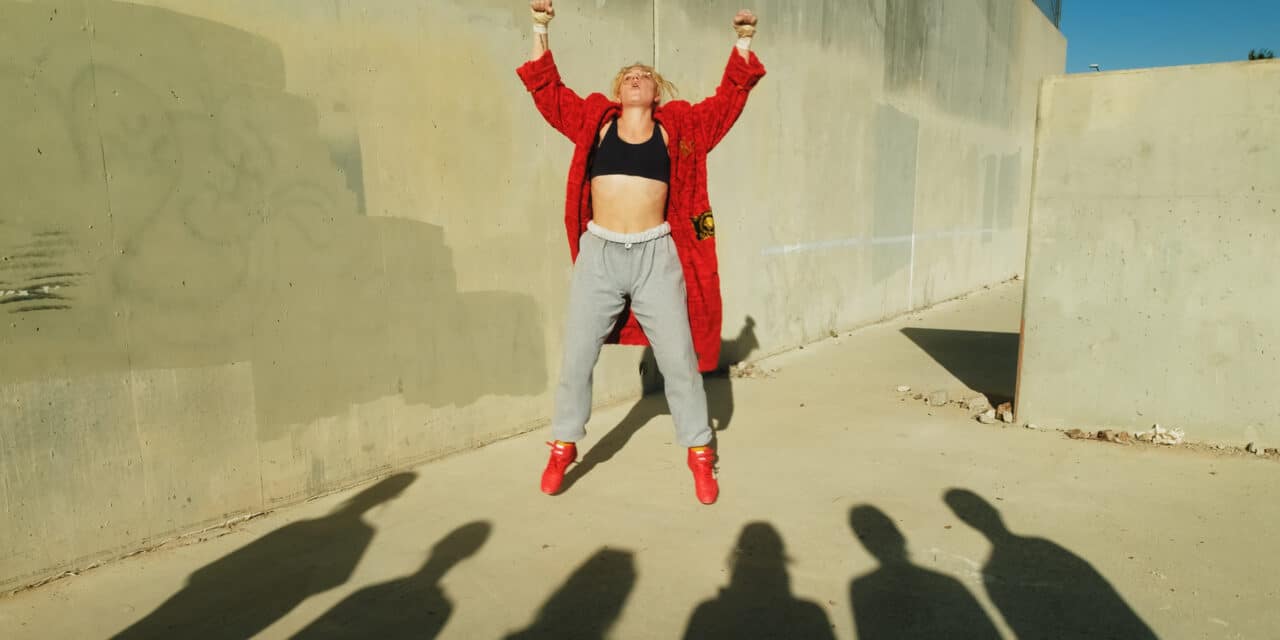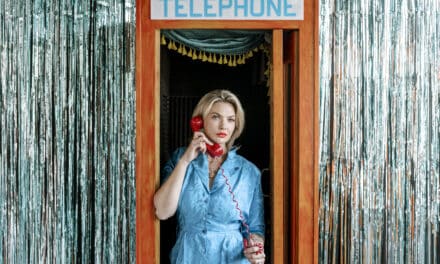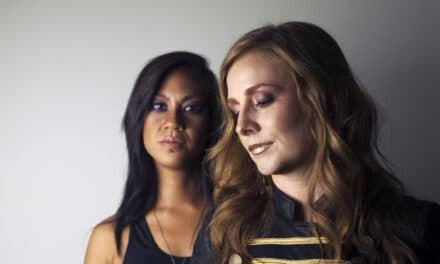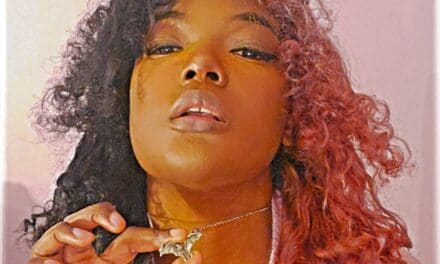There’s nothing fragile about Glass Jaw. The debut EP from Kat Cunning — out October 3 — doesn’t flinch, doesn’t stutter, doesn’t ask for permission. It lands like a cinematic collision of queer intimacy and theatrical danger, equal parts bruised and celebratory, a five-track manifesto that establishes Cunning as one of the boldest voices in modern pop.
For an artist whose resume spans Broadway, Cirque du Soleil, TV, and film, and who has shared stages with LP, Vérité, and G Flip, the EP feels less like an arrival and more like a declaration. Cunning’s voice — rich, raw, and commanding — becomes the weapon and the shield across a record that thrives on contradictions: lush but gritty, poetic yet feral, intimate but made for arenas.
From the opening blow, Glass Jaw makes it clear this is a fight you want to be part of. “Sinderella” twists fairytales into an unhinged anthem of obsession, performed at the top of Cunning’s range — a drag debut that’s theatrical, kinky, and irresistible. It’s the sound of a door slamming open.
“Dancer” is pure queer defiance — sweaty, defiant, and alive with the ghosts of Depeche Mode and Annie Lennox. Muscular production underpins aching vocals that morph into a galvanizing rallying cry for the queer community. It’s not just a pop song; it’s a war drum dressed in neon.
And then the EP pulls the rug. “Pinup Boy” slows the tempo into devastating intimacy, a confessional ballad framed by organic strings and nostalgic harmonies. It’s the quiet moment in the chaos — a reminder that Cunning, beneath the spectacle, has the instincts of a poet.
But the spectacle returns with “Rocketship,” a queer sci-fi hymn that’s both cosmic and deeply grounded in history, paying homage to the space songs of queer pop past. Futuristic synths crash into Labyrinth-esque samples, creating a track that feels like refuge and promise all at once.
Finally, “My Lady (Tigerlily)” closes the EP not with despair, but with joy — a giddy, bombastic love song that dares to let queer stories end in triumph. It’s the confetti cannon, the seal of hope, the unapologetic reminder that in a world of shadows, there is still space for radical joy.
Together, these five tracks form a body of work that is theatrical yet vulnerable, feral yet celebratory — a love letter and a battle cry. With Glass Jaw, Kat Cunning doesn’t just enter the pop arena. They seize it, reshaping it into a space where queer stories are loud, ecstatic, and unstoppable.
This isn’t just an EP. It’s a blueprint for what fearless, visionary pop can be in 2025 and beyond.
Glass Jaw feels both feral and celebratory — a love letter and a battle cry. How did you approach shaping such extremes into one cohesive debut?
It was at the forefront of my mission with this EP to make something that embodied all different sides of me. I made movies before I sang and I was a concert dancer before that. Even before then, I wrote poetry. I think the best artists in any medium can make you teeter between laughing and crying and lunging into battle. It’s complicated to be a human, and I like the challenge of writing those nuances into the pop genre, where they’re often overlooked. Especially with an uptick in censorship, art that is subversive and genre defying can be a game of telephone- I want these earworms to carry across town before people even realize they’re humming a trans anthem.
You’ve moved from Broadway to Cirque du Soleil to TV and now this EP — how do all those different worlds bleed into the way you write and perform music?
At the end of the day, I’m a story teller, and I love to be in the company of other story tellers. Whether I’m performing in a cabaret and introducing a sword swallower, doing the same choreography for the 600th time on a Broadway stage, or living something entirely new in front of a camera- it’s the desire to sublimate my life’s experience into something tangible for an audience, so they can chew on it until it reshapes a part of them. I think music is the easiest way to enter someone’s tangible life. With the right set of chords and the willingness to tell the story truthfully as a singer, you can hack the emotional frequencies that usually go untapped. So- in all these mediums, but especially music, I just try to keep the truth at the forefront of my story. We all feel alone, but the truth is, if we open our mouths and tell our stories, we very rarely are.
“Sinderella” flips the fairytale into something kinky, unhinged, and obsessive. What drew you to subvert those tropes, and how does drag factor into that artistic rebellion?
I wanted to play the boy. My fans call me Dad, and that started in a strip club I worked in (add another stage to the resume!) Although I still worked as a femme fatale in the club, singing for the dancers, they all knew the nonbinary/trans dude in joggers and a hoodie that showed up every night backstage. I love to play with gender, so I haven’t made any drastic changes to my appearance to align with my gender identity, but as you can imagine- I’m often challenged for identifying that way when I look this way. Sinderella was an amazing opportunity to give a love letter to those strippers I worked with who gave me my name, while GAGGING the KIDS with my amazing drag king character Jared in the music video. It’s giving REALNESS HUNNY! Most people don’t even know it’s me in a wig in the Sinderella music vid.
“Dancer” radiates defiance and feels like an anthem for radical queer joy. Was there a specific moment or community experience that ignited that track?
There’s a Dan Savage quote I found around the final stages of this record that sums it up. “During the darkest days of the AIDS crisis, we buried our friends in the morning, we protested in the afternoon, and we danced all night. The dance kept us in the fight because it was the dance we were fighting for. It didn’t look like we were going to win then and we did. It doesn’t feel like we’re going to win now but we could. Keep fighting, keep dancing”
Dancer is both a literal homage to my life in concert dance and a direct analogy for fighting for our rights and lives as marginalized people. A metaphor for that unique form of resilience we unlock as a community on the dance floor. With our rights hanging in the balance, I really mean it when I say, “Dance, Dance, Dance, until you die.”
With “Pinup Boy,” you slow everything down into pure intimacy. How do you navigate vulnerability in your work without losing the theatrical edge you’re known for?
I believe you don’t lose edge when you slow down. When things are slower, and softer and more spacious, you have time to see and feel their edges. If I weren’t so excitable on stage, I would only write you slow songs. In my ears, I love nothing more than feeling the intimacy and swag of an artist taking space and time and asking me to come to them. Pinup Boy is like a voice note with an orchestra behind it, and that’s the kind of edgy theater I’d buy a ticket to see.
Queer lineage runs through “Rocketship,” a hymn to cosmic escape. What queer space songs inspired you, and how do you see yourself adding to that tradition?
Rocket Man by Elton John must be mentioned, but I was also directly inspired by David Bowie- speaking of time and space and theater, I was obsessed with Space Odyssey when I was kid, and for over a year I sang Life On Mars in a cabaret during the pandemic. I think space is like vampires and monsters for queer people- stories of otherness, and whole worlds built on subcultures resonate. I wrote Rocketship on a day the news was particularly scary for queer people- it’s a promise that I will do anything I can to create a place where we are safe, accepted and in power, and whenever possible- I will make it a sexual innuendo, too.
The EP ends with “My Lady (Tigerlily),” this unapologetically joyful, triumphant track. Was it important for you to end on a note of queer celebration rather than tragedy?
There are too many queer characters written by people who can’t imagine us as main characters who win love in the end. I’m a moody scorpio and music gives me an outlet for that, but at the end of the day, I’m a pop maximalist softie who just wants my people to have the simple good things that the heteros get. So bitch- go off with your pumpkin spice latte drive with the top down to this one cus you deserve to have basic rom com fun too! I wrote it when I was falling in love with MY LADY so I know it’s possible, HEAUX!
Your voice is described as commanding and cinematic — do you write songs with visuals in mind, or do the visuals follow after the music?
I write with the words in mind, and then I get immediately excited to step into the film version- but I can imagine 10000 visuals to every song. Production isn’t a fixed thing for me, either- the way a song can be reshaped by production is thrilling to me- but the bones of the song are the words and the story and of course the melody, which will always be some kind of sorcery to me. I will never unlock the math of music- to me, it will always be majestic that these separate notes make songs that we carry through our lives.
The title Glass Jaw suggests both fragility and power. What does that metaphor mean to you personally as a queer artist in today’s pop landscape?
It’s a boxing phrase for when you fall down and shatter, easy. To be honest, I have had a lot of teeth issues in the last 5 years. After being an artist for 10 years without dental insurance, by the time I had it, after some very jenky dentistry, I needed 4 root canals, and one whole pulled tooth. This aligned with some of the most intense destabilization and heart break of my life, and the metaphor was literally pounding on my nerves. I think America is built on a Glass Jaw. Our systems require that its people stay weak, uninformed, divided and in pain, so that the few in power can keep us from getting up and fighting.
I found it really hard to find my voice through those times, so I decided to embrace that I can still be a fighter even when my literal jaw and my heart are fragile. That’s how I came to the title ‘Glass Jaw’.
You’ve already shared stages with LP, Vérité, and G Flip. As you step into your own headlining moment, what kind of space do you want a Kat Cunning show to be for the fans who show up?
“When nothing feels the same, I’ll take you away.” Lyrics from Rocketship, it really is a mission statement for the kind of space I want to create for my audience. Whether you’re a kinky freaq with a kind heart who doesn’t have anywhere to wear your new Latex, or a good example of a cis white boy who’s having a hard time finding spaces to cry and fight toxic masculinity- whether you’re young or old or gay or straight, or just friggen stressed out about the current political climate, it is my wish to look out into a truly diverse crowd, cus we won’t get very far talking to ourselves.
I hope it will be a night you never forget. I hope you use the code word “glass jaw” to get someone to make out with you between songs. I hope you move your hips a lil more than you ever have in public. I hope you cry and make friends and feel beautiful and perfect, cus you are. It’s the world that’s a mess.
“Breathe in cus we’re not dead yet and we’ve come so far.”
You can expect to celebrate how far we’ve come.


